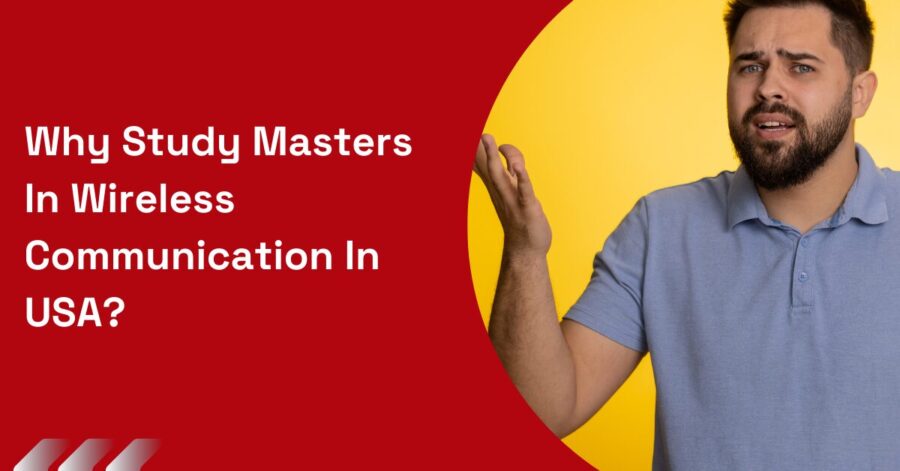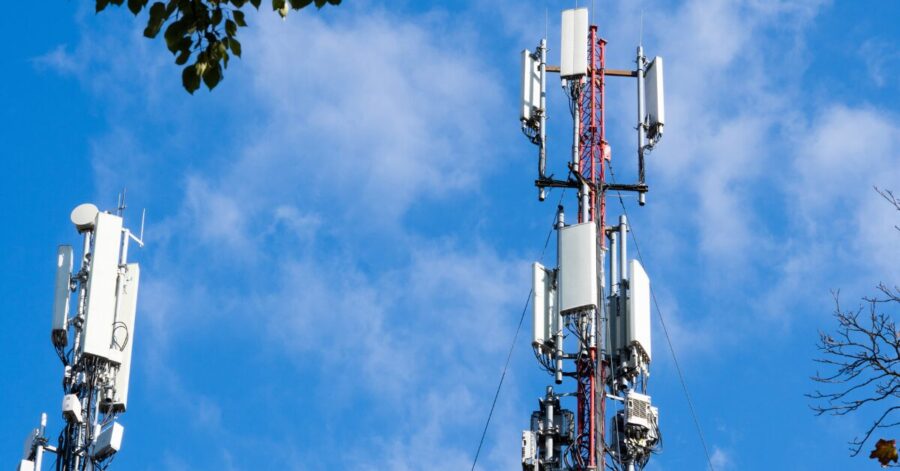18 December 2024
5 minutes read
Why Study Masters Of Engineering In Wireless Communication And Computer Networks In USA?

Key Takeaways
- The wireless communication market will reach $1.6 trillion by 2025, making a Master’s in this field highly valuable.
- A Master’s in Wireless Communication in the USA offers hands-on experience in Radio Frequency design, 5G, and more, leading to strong career prospects.
- Despite competitive admissions, top U.S. programs offer significant ROI with salaries over $100,000.
By 2025, the global wireless communication market is projected to reach $1.6 trillion. As wireless technology rapidly advances with 5G networks and the Internet of Things (IoT), the demand for professionals in wireless communication systems is soaring. Yet, many graduates struggle to bridge the gap between theoretical knowledge and the practical skills needed for modern communication networks protocols.
Undergraduate programs often provide a strong foundation in electrical and computer engineering, but they rarely offer the specialized expertise needed in areas like 5G, and signal processing. Pursuing a Master’s in Wireless Communication in the USA equips students with hands-on experience and advanced systems engineering skills, preparing them for critical roles in the future of communication networks.
What Masters Programme In Wireless Communication And Telecommunication Engineering Is All About?
A Master’s in Wireless Communication is a specialized degree that delves deeply into the field of cordless technologies, preparing students to meet the demands of industries focused on mobile networks, design, and 6G development. This program equips students with advanced knowledge in areas such as digital signal processing, mobile computing, and light-based communications, making it an essential path for those interested in pushing the boundaries of communication systems.

Here are a few things that will give you a better understanding:
- Comprehensive Curriculum: A degree in wireless communication and signal covers a broad range of topics, including mobile networks, digital signal analysis, optical communications, and design, giving students a thorough understanding of modern wireless systems.
- Research and Innovation: Programs like the one at the Illinois University emphasize research and development, encouraging students to explore cutting-edge fields like Sixth Generation technology, communication engineering and computing.
- Hands-On Experience: These degrees focus on practical learning, teaching students to manage complex communication systems through hands-on projects and real-world applications.
- Career Opportunities: With the growing demand for wireless technology expertise, graduates can pursue lucrative careers in design, mobile connectivity, and the development of next-gen wireless systems.
- Tuition Fees and Investment: While tuition cost vary, the return on investment from a Master’s in Wireless Networks and telecommunication can be substantial, particularly for those with a bachelor’s degree in engineering who are looking to specialize in this high-demand field.
10 Top Universities To Study MSc in Wireless Communication And Telecommunications In USA
The USA remains one of the top destinations for students pursuing advanced degrees, especially in cordless communication. With leading institutions at the forefront of technological innovation, students in the USA have access to cutting-edge facilities, research opportunities, and a robust job market.
Here are 10 universities which are popular for this course:
| University | QS World Ranking 2024 | Average Fees (per year) | Average Salary (post-graduation) |
|---|---|---|---|
| Massachusetts Institute of Technology (MIT) | 1 | $53,790 | $120,000 |
| Stanford University | 3 | $56,169 | $125,000 |
| University of California, Berkeley | 10 | $44,008 (in-state), $59,734 (out-of-state) | $115,000 |
| California Institute of Technology (Caltech) | 6 | $58,680 | $118,000 |
| University of Illinois at Springfield | 82 | $34,719 (in-state), $52,680 (out-of-state) | $102,000 |
| Georgia University | 88 | $13,086 (in-state), $28,568 (out-of-state) | $108,000 |
| University of Southern California | 100 | $60,446 | $103,000 |
| University of Michigan, Dearborn | 23 | $25,048 (in-state), $50,140 (out-of-state) | $110,000 |
| Cornell University | 20 | $62,456 | $107,000 |
| Illinois Tech University | 401-410 | $29,328 | $98,000 |
What Are the Admission Requirements To Study Masters In Communication In USA?
The admission requirements for studying a Master’s in Wireless Communication in the USA typically involve a combination of academic qualifications, standardized test scores, and relevant documents. However, one real-life problem that many students face is the highly competitive nature of the admissions process. Despite having strong academic backgrounds, students often find themselves competing against hundreds of qualified applicants for limited spots in top colleges.

Bachelor’s Degree
Applicants need a bachelor’s in telecommunication engineering, computing sciences, or electrical engineering. Program in wireless communication are preferred as they provide a strong foundation in fundamentals of wireless radio and communication systems and networks. Most engineering programs, including those at Illinois University, expect a GPA of 3.0 or higher.
Standardized Test Scores
For programs like the MSc in Wireless Communications and Radio Frequency Systems, many top colleges require GRE scores. International students should also provide TOEFL or IELTS scores to meet English proficiency standards for advanced communication programs.
Letters of Recommendation
Two or three letters from professors or professionals are necessary to highlight an applicant’s potential in areas like RF design, signal analysis algorithms, and mobile computing. These recommendations can showcase readiness to tackle the challenges in the field of cordless networks.
Statement of Purpose (SOP)
The SOP should detail the applicant’s motivation for pursuing a degree in wireless communication, linking prior education or research in architecture for wireless communication systems and upper-layer protocols to career goals in next-generation cordless signals.
Resume/CV
Applicants must submit a resume outlining skills in cordless communications, digital signal processing, and channel coding. Research projects in areas like efficient communications infrastructure or 6G technologies strengthen applications for these competitive programs.
Application Fee
Universities typically charge a non-refundable fee between $50 and $150. Contact schools directly for exact details and ensure all materials are submitted.
Additional Materials
Some top colleges may request portfolios or publications. Institutions like National Central University might include assessments of skills in optical communications, quantum processing, or embedded systems.
Conclusion
In the rapidly evolving world of wireless communication, pursuing a Master’s degree in the USA can be a game-changer for your career. With the industry set to reach $1.6 trillion by 2025, this advanced degree not only equips you with technical skills in areas like RF design, 5G, and signal processing but also places you at the forefront of the next wave of innovation in computing sciences and electrical engineering.
Studying at top universities in the U.S. offers more than just education—it provides access to cutting-edge research, real-world projects, and a network of industry leaders. While the admissions process can be competitive and tuition fees steep, the investment prepares you to master the core of network communications, excel in engineering and computer fields, and tackle challenges in information technology. Students can choose this path to unlock substantial career opportunities and make a lasting impact in wireless technology.
Transform your professional journey with Ambitio Pro, where you’re not just advancing your career, but evolving into an industry leader. Our comprehensive resources, industry insights, and personalized development plans are tailored to propel you to the forefront of your field.
FAQs
What is the duration of a Master’s program in wireless communication in the USA?
Most Master’s programs in wireless communication in the USA, like those at the University of Southern California and the University of Michigan, typically span 2 years.
Are there scholarships available for international students pursuing a Master’s in wireless communication in the USA?
Yes, many universities in the USA offer scholarships and financial aid for international students. It’s advisable to check with the specific university for available opportunities.
What are the typical career opportunities after completing a Master’s in wireless communication?
Graduates can pursue careers as RF Engineers, Network Engineers, Wireless Communication Researchers, Systems Engineers, and more, with salaries ranging from $70,000 to $120,000.
Do I need a GRE score to apply for a Master’s in wireless communication in the USA?
While many programs require GRE scores, some universities have waived this requirement, especially during the 2021-2024 academic years. It’s best to check the specific requirements of the program you’re interested in.
Can I work on practical projects or internships during my Master’s in wireless communication in the USA?
Yes, many universities, such as Northeastern University, offer practical experience through internships and cooperative education programs, allowing students to apply their learning in real-world settings.

You can study at top universities worldwide!
Get expert tips and tricks to get into top universities with a free expert session.
Book Your Free 30-Minute Session Now! Book a call now




























